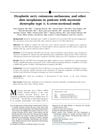 November 2018 in “Journal of investigative dermatology, venereology and cosmetology”
November 2018 in “Journal of investigative dermatology, venereology and cosmetology” Biofield Energy Treatment, specifically The Trivedi Effect®, can potentially enhance hair growth by increasing the growth activity of human dermal papilla cells.
 4 citations,
June 2013 in “The Journal of Rheumatology”
4 citations,
June 2013 in “The Journal of Rheumatology” The document concludes that various findings in rheumatology offer insights into disease severity, treatment responses, and potential risks in medication, with some limitations due to unspecified participant numbers.
 19 citations,
January 2011 in “Obstetrics and gynecology international”
19 citations,
January 2011 in “Obstetrics and gynecology international” Red clover extract improved hair, skin, mood, sleep, and tiredness in postmenopausal women.
75 citations,
March 2018 in “Molecules/Molecules online/Molecules annual” L-Cysteine may have health benefits, but its effectiveness is still debated due to limited clinical trial data.
September 2021 in “Journal of the Dermatology Nurses' Association” The convention discussed various skin conditions, treatments, and the importance of continuous learning in dermatology nursing.
 21 citations,
April 2011 in “Physiological Research”
21 citations,
April 2011 in “Physiological Research” Normal levels of DHT can reduce belly fat and increase muscle, but too much can lead to hair loss, prostate issues, and possibly heart disease.
 11 citations,
January 2015 in “Journal of The European Academy of Dermatology and Venereology”
11 citations,
January 2015 in “Journal of The European Academy of Dermatology and Venereology” Hair loss gene linked to prostate issues.
 23 citations,
January 2015 in “Journal of The American Academy of Dermatology”
23 citations,
January 2015 in “Journal of The American Academy of Dermatology” People with myotonic dystrophy type 1 have a higher chance of getting skin tumors, including melanoma.
 7 citations,
October 2020 in “Dermatology practical & conceptual”
7 citations,
October 2020 in “Dermatology practical & conceptual” Some skin, hair, and nail supplements can be toxic, interact with medications, affect lab tests, and may increase cancer risk.
January 2019 in “Deleted Journal” Biofield Energy Healing may promote hair growth and treat skin disorders by enhancing hair follicle development.
 6 citations,
March 2022 in “Frontiers in drug discovery”
6 citations,
March 2022 in “Frontiers in drug discovery” Some small molecule antivirals show promise against COVID-19, but more research is needed to understand and improve them.
 October 2024 in “Archives of Dermatological Research”
October 2024 in “Archives of Dermatological Research” Higher GPER-1 levels are linked to more severe and shorter-duration androgenetic alopecia, suggesting GPER-1 as a potential treatment target.
September 2017 in “Eureka, Health Sciences/Eureka, Health Sciences.” Chronotherapy is more effective than traditional treatment for alopecia areata.
 3 citations,
June 2023 in “MedComm”
3 citations,
June 2023 in “MedComm” Stem cells and their exosomes show promise for repairing tissues and healing wounds when delivered effectively, but more research is needed on their tracking and optimal use.
 24 citations,
September 2008 in “International Braz J Urol”
24 citations,
September 2008 in “International Braz J Urol” Lovastatin doesn't improve lower urinary tract symptoms treatment.
 January 2018 in “Clinical dermatology open access journal”
January 2018 in “Clinical dermatology open access journal” The Biofield Energy Treated herbal mixture increased hair growth in mice compared to the untreated mixture.
 5 citations,
March 2023 in “Archives of dermatological research”
5 citations,
March 2023 in “Archives of dermatological research” Increased HIF-1α is linked to the inflammation and severity of hidradenitis suppurativa, suggesting treatments that lower HIF-1α could help.
 28 citations,
September 2014 in “Journal of Clinical Oncology”
28 citations,
September 2014 in “Journal of Clinical Oncology” Men with baldness at the front and top of their head at age 45 may have a higher risk of aggressive prostate cancer.
 122 citations,
November 2010 in “Journal of Dermatological Science”
122 citations,
November 2010 in “Journal of Dermatological Science” Male pattern baldness involves hormones and cell signals affecting hair growth.
 April 2019 in “Journal of Investigative Dermatology”
April 2019 in “Journal of Investigative Dermatology” Caffeine can protect scalp hair follicles from damage caused by UV radiation.
62 citations,
January 2015 in “Journal of Dermatological Science” New genetic discoveries may lead to better treatments for alopecia areata.
 6 citations,
June 2022 in “Dermatologic Therapy”
6 citations,
June 2022 in “Dermatologic Therapy” Honokiol from Magnolia plants may be beneficial for treating various skin conditions and promoting hair growth.
 116 citations,
February 2017 in “Journal of the American Academy of Dermatology”
116 citations,
February 2017 in “Journal of the American Academy of Dermatology” JAK inhibitors help with skin conditions but need more research on dosing and safety.
 290 citations,
December 2017 in “Journal of The American Academy of Dermatology”
290 citations,
December 2017 in “Journal of The American Academy of Dermatology” Alopecia areata is an autoimmune condition causing hair loss, influenced by genetics, stress, and diet, and may be prevented by a high soy oil diet.
 August 2024 in “PLoS ONE”
August 2024 in “PLoS ONE” Younger Jordanians know more about rosemary, often using it for hair and stomach issues.
 January 2018 in “Open access journal of pharmaceutical research”
January 2018 in “Open access journal of pharmaceutical research” Biofield Energy Healing may increase hair growth by enhancing cell proliferation.
 7 citations,
January 2023 in “Journal of Hematology & Oncology”
7 citations,
January 2023 in “Journal of Hematology & Oncology” Using protein degradation to fight cancer drug resistance shows promise but needs more precise targeting and fewer side effects.
1 citations,
January 2021 in “Acta Cirurgica Brasileira” Dutasteride and finasteride cause kidney damage, with dutasteride being more harmful.
 2 citations,
January 2023 in “Journal of Clinical Medicine”
2 citations,
January 2023 in “Journal of Clinical Medicine” People with hair loss conditions may also have thyroid disorders, but more research is needed to understand the connection.

Certain natural products may help stimulate hair growth by affecting stem cell activity in the scalp.























